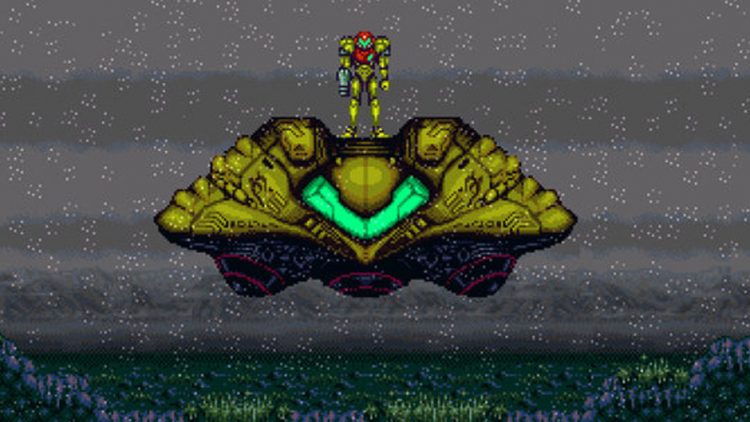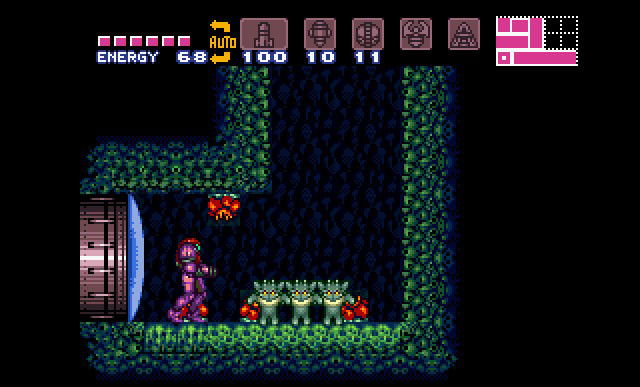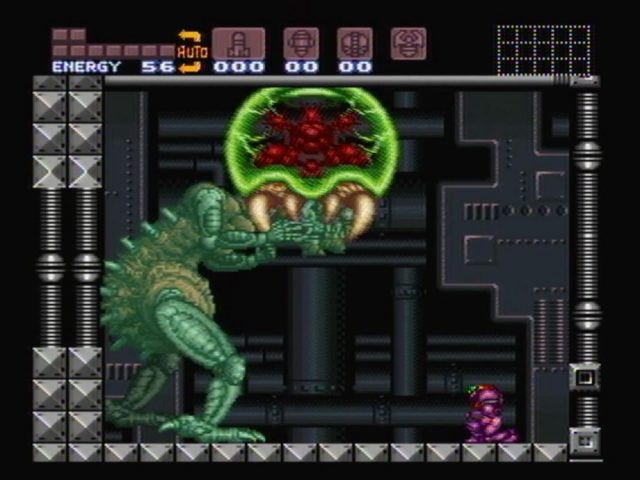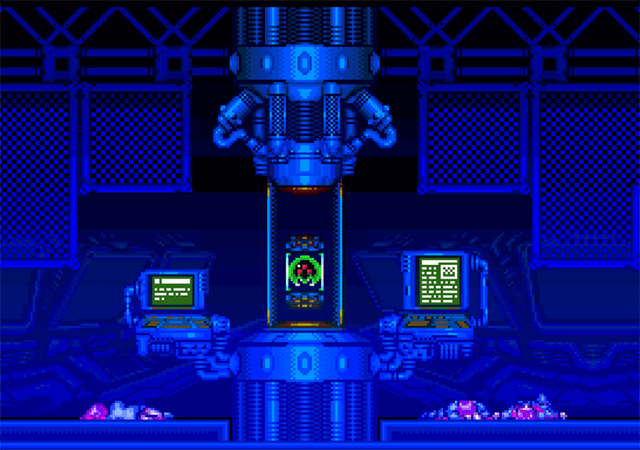Living in the past will only ensure one more speedily becomes such; after all, if you’re not growing, you’re probably dying. While that’s not necessarily the fate of Nintendo’s hallowed but ancient (for video games) Metroid franchise quite yet, there’s no question that the shadow of its seminal SNES entry has loomed large over each subsequent title, influencing perception of what a Metroid game should be and creating an awkward rift between a company known for mixing innovation with nostalgia and its loyal fans who don’t like change. With no way to improve upon perfection, Super Metroid may represent the peak of a series, as well as the anchor dragging it down.
The recent release of Metroid Prime: Federation Force is only the latest example showcasing this dilemma. Fans were so up in arms upon the game’s reveal that a petition to cancel development was created that actually acquired more than 24,000 signatures(!). The gist of the complaint was that this new abomination didn’t contain any elements of what the franchise is all about, “the foundations of isolation, atmosphere, and exploration,” continuing on to state that “this is not the Metroid we asked Nintendo to make.” Of course, we all know what that means, and it has everything to do with those “foundations” that Super Metroid solidified back in 1994. Unlike Mario games and his spinoffs, which are generally accepted to be gaming experiments where new ideas come and go with the wind, often during a single level, any alteration whatsoever to the formula for Samus’ adventures is met with stiff opposition.
In a way I really can’t blame anyone, as I completely sympathize. Super Metroid achieved a balance of design and gameplay like almost no other game in history, with a haunting vibe and plenty of replay value that has kept me coming back to it year after year, like going home again to planet Zebes. Its magic trick of guiding the player through the labyrinthine underworld without seeming to, teaching new techniques organically (super jump bird is amazing) instead of through wall-breaking text box tutorials, and adhering to and expanding upon its originator’s lonely ambiance, makes Super Metroid perhaps the most immersive game in the series. Naturally, those who have spent hours uncovering its many secrets on the way to the powerful and possibly heartbreaking climactic battle with Mother Brain would want more of this. Why try anything else?
However, like a Great White shark that must keep swimming lest it drown, Nintendo’s instinct is to keep moving forward, resisting the easy path of simply remaking the same game over and over again. Because this often goes against the wishes of their customers, they are understandably hesitant, caught between an energy sucking alien and a Space Pirate, walking the tightrope between making sure their own bread is buttered yet expressing creativity that prevents moldy stagnation. More than any one of their other AAA properties, it seems that Metroid undergoes the most scrutiny. Sure, Toon Link riled everyone up, but so did Samus’ move from 2D to first-person shooter. Metroid isn’t a shooter! How will platforming work in a first-person shooter? Give us Super Metroid! The result, of course, was a masterpiece that still ranks among the most critically acclaimed games of all time on Metacritic. Loved as it is, even Metroid Fusion, a Super Metroid clone released on the same day as Prime (presumably as appeasement), garnered some nitpicking for its tendency toward increased linearity when compared to its predecessor. Ditto Metroid: Zero Mission.
Those games are respected and adored now, but the reasons why often revolve around how well they replicate that Metroid “feeling”. You know, the one that Super Metroid slammed out of the park and subsequently set up unrealistic expectations for with every sequel henceforth. Metroid games can not be judged simply on their own merits, but how closely they come to touching the stars.
That’s the way it is with Metroid fans: Echoes is too hard, Corruption doesn’t feel isolated or connected enough, Other M has awkward controls and ruins Samus by making her into a whiny brat (that one’s true). Not everything has worked, some have surprisingly well, but nevertheless on and on it goes, eventually circling back to the same demand: give us the experience we want, give us Super Metroid again. No matter that plenty of other titles have taken up the mantle and provided the genre with fresh entries; from a cavalcade of Castlevanias to lighter fare like Guacamelee!, those looking to satisfy their exploration itch have options. But great as those games may be, they’re not the same. They never will be either, because we can’t go back in time to that moment we first heard those familiar creepy tones or discovered Zebes hidden secrets or watched that moment of sacrifice. We can’t un-see what we have seen, no matter how badly we want to.
As Leonardo da Vinci opined, “once you’ve tasted flight, you will forever walk the earth with your eyes turned skyward, and there you will always long to return.” I have no doubt that Nintendo wants to pilot fans up to the heavens anew, but not in a spaceship built 30 years ago. The persisting insistence on adhering to formula and negative reactions to attempts at deviation, deserved or not, has clearly fatigued them of the franchise. Though it’s doubtful they would abandon it in the near future, the day may come when Samus is forced into early retirement, that once mighty Power Suit exhausted and spent.
Look, while previews of Federation Force have been extremely disappointing to say the least, and a demo for the pack-in mini-game Blast Ball did more to convince me to stay away than make a purchase, my problem doesn’t stem from the Metroid name being stamped on this ill-advised 3DS online multiplayer shooter. It’s the mediocre gameplay and the concept of a handheld experience that relies so heavily on the presence of 3DS friends or a strong wi-fi signal that turns me off and makes me wonder what exactly Nintendo was thinking with this one; Splatoon it ain’t. Yes, like most others I wait with bated breath each E3, hoping a “proper” Metroid game will be announced, only to be crestfallen yet again, but this is the life of a Nintendo fan, and it’s as it should be.
Because of their willingness to think outside the box and experiment, Nintendo is perpetually capable of surprising greatness. With peaks so high there occasionally come valleys so low, but that’s what makes the roller coaster such a fun ride. With a new generation of developers full of fresh ideas, I hate to think that something decades old could end up representing the peak of the franchise. Perfect though Super Metroid may be, perhaps something even more amazing awaits, if only Samus could break free from from her own grapple beam and rocket once again into the vast unknown.





